- Home
- catt dahman
Z Poc: Young Brains
Z Poc: Young Brains Read online
Z-Poc: Young Brains
catt dahman
Copyright.
catt dahman
© 2013 catt dahman
[email protected]
ALL RIGHTS RESERVED. This book contains material protected under International and Federal Copyright Laws and Treaties. Any unauthorized reprint or use of this material is prohibited. No part of this book, including the cover and photos, may be reproduced or transmitted in any form or by any means, electronic or mechanical, including photocopying, recording, or by any information storage and retrieval system without express written permission from the author / publisher. All rights reserved.
Chapter 1
Outbreak
There was a situation, an accident, and an ego that postured. There was a mother of two children, and when she heard that everyone was to go immediately to the courthouse because there was a biological problem, she went to get her two children from school.
She ignored the orders from the police. Her wrist ached horribly where her neighbor had bitten her; you could just bet there would be hell to pay for that little episode.
After she got the children, she was going to the medical clinic and then to a lawyer’s office because a person normally didn’t go around biting other people for no damned reason.
Halfway to the school, the woman felt nauseated, dizzy, and feverish.
When she entered the school, she felt distant and very hungry. As she walked down the hallway, shambling and weaving, she was no longer herself and didn’t remember her two children or being bitten.
Chapter 2
Classroom Views
If I had had everything going my way when I was in my first year of high school: being attractive, athletic, and popular, having clear skin, being wealthy, and making excellent grades, then you simply won’t get how bad my last day at school was (well, how bad every day was). If you had maybe only one of these go your way, then you might get it. I guess it depends on your take.
I was one of those who was plain, with shoulder-length, mousy brown hair and a normal face, nothing special or note worthy. I had the occasional pimple but not a load of them all at once, so I was lucky in that respect. I wasn’t popular, fairly invisible, which was also better than being visible and bullied by the rest. You could mention my name, and the other students didn’t get mental images of anyone but just drew a blank. I was nobody.
My athleticism consisted of the coach yelling at me a lot when I tried to play volleyball, and it went something like this:
“Arisbe, move to your left. No, your other left. More, more, no, not outside of the court. There. Heads up, Arisbe. No, don’t look at the ceiling. Stop looking at the floor. Arisbe, why didn’t you hit the ball? No, don’t kick it; this isn’t kick ball; why are you over there? Move to your right. OK, never mind, just stand where you are. No, don’t catch the ball.”
Then within a few minutes into the game, the coach would say, “I need a note delivered to the office. Arisbe, take it there for me. And no need to rush.” So I became the runner for notes to the office,to other teachers, to the coach’s car for her sunglasses, to check the weather, and for everything else imaginable.
I stayed at an even C+ and B- in math and science and allowed the occasional A- in English and history, so I never was in trouble but never was pointed out as the class brain, either.
And I was definitely not a rich kid.
People also forgot my name, made fun of it, or got it wrong. Half the time I was Frisbee.
We were in history class, one of my favorite classes when we knew the world had started going to hell; it could have started an hour earlier when I had been in math. I never grasped how figuring out the something of a circle would benefit me in my future, especially since I had no idea what I wanted to pursue as an occupation; I will say it would not involve circles.
The lecture was about the Trojan War, and we were almost to the point when one of the main characters, Hector, would be killed on the battlefield. I loved that part when noble Hector faced the crazy Achilles.
One of our teachers, Miss Crater, ran in from across the hall and whispered to Mr. Tryon, waving her arms, pointing, and shaking all over.
Miss Crater was generally a quiet teacher, one who taught literature and waxed lovingly over poetry; this was greatly out of character for her to run in, much less to be so dramatic about anything.
Her hair was always in a high bun, kind of like Sophia Loren or the New Jersey girl, tall hair that was teased at the top, almost messy but sprayed heavily to keep the stray strands in place. She wore simple blouses with high necklines that were faintly Edwardian-styled and straight skirts of black to grey to navy to dark green to heather-grey to burgundy (dark, muted colors) with stockings and very high, blocky heels every single day. Her stockings had a seam down the back, and the seams were always spot on perfect; the only adornments were a silk scarf in colors to match the skirts and tiny pearl earrings.
I thought that she was almost in costume and that she dressed to look exactly how one would expect a literature teacher to dress; that was kind of cool in a way.
“That is absurd,” Mr. Tryon’s voice was louder.
“Then come see for yourself, but the son of a bitch is right out side my window.” Miss Crater’s cursing was a new thing. She was always very prim and very proper and addressed us as Mr. and Ms. So-in-So, and we said ‘Yes, Ma’am’ and ‘No, Ma’am’.
Periodically, in the middle of speaking to her, we would realize she was inserting French words and that we understood them and were speaking as stilted and English-proper as she was. So knowing all that, we understood that hearing her use of faintly, whispered profanity was the biggest shock of our lives.
Mr. Tryon set his big book down with a thud, not even marking his place, which meant that he must have half-believed whatever she told him and didn’t think we’d be talking about Greek history again that day.
He followed Miss Crater out of the room; strangely, most of the first row of students and part of the left side followed as well, which was unusual.
We weren’t in the habit of getting up and walking out of a classroom, but the rules already seemed altered. Like ducklings, we fell into line right behind him and went to her classroom.
His classroom had windows that looked out to the east. Her classroom was a corner room and had windows facing both the east and the north.
The office secretary, Mrs. Smith, was coming down the hall and was motioning to the teachers to go to the open doors to listen to her, but no one bothered to listen, and she followed us into Miss Crater’s room.
“We are going to lock down,” she said as she saw us looking at her curiously. “Not to lock down, but the status of lockdown. All one word, the serious word.”
In the wake of endless attacks on schools by those who thought it would solve many problems by randomly shooting innocent students, principals, and staff had put into place some strategic moves that they were supposed to use in the event of an attack.
Our school was fairly small with about twenty or less in each grade, and we didn’t have metal detectors or anything fancy. There were two classes for each grade level, so ten per class and seniors to kindergarten were stuffed in the school, two hundred of us in all since some were out sick. The little ones were downstairs, and upper grades were upstairs.
We had many teachers and small classes because wall of us used the same building; it was an old building but still well built and had been spruced up a few years before, so it was quite nice. We had a fairly fat tax base even with that few of students in attendance.
Besides, teachers worked here for less money because they had fewer classes to teach, fewer discipline problems if any at all (an occasional back-talk, gum che
wing, or a tardy at the most), and because the school system allowed more creative freedom for teachers here.
I knew all this because my dad was the superintendent.
I peeked into Miss Crater’s classroom; there were about ten students, and all were at the windows of the old school building,staring outside and making noises like gagging or saying, “Ooooo.”
“That’s sick.”
“What the hell is she doing?”
And one girl was staggering away, her hand to her mouth as she ran out, probably to a restroom. Some of my classmates from history class went to look with Miss Crater and Mr. Tryon, and when there was a space, I went to look out the window, too.
Some of the students gathered their desks in a circle to talk about it, and a few walked out the door, but no one said a word.
In the parking lot down below, I saw some of the juniors and seniors running for their cars; they were the only students allowed to have a vehicle on campus. People crawled into their cars and sped away, dodging people who were slowly walking about.
That in itself was strange; right in the middle of the morning, students were walking away from classes and getting into cars and driving away, and their dodging people who walked stupidly towards the school was a whole other matter.
Some of those walking around looked familiar: juniors and seniors and a bus driver, and two people I didn’t know. Each had the same dull, facial expressions and crazed, milky eyes and were wearing clothing that was blood-covered, and had obvious injuries.
The bus driver’s arm was hanging by a piece of skin, was flayed to the bone in places and was dripping gore. His jaw was ripped and torn as well. I was shocked he was walking and not on the ground waiting for an ambulance or even dead from the injuries.
One of the senior girls was on the ground, pulling intestines from another girl’s stomach; the intestines were pinkish grey, and the senior was chewing on one end, taking bites and rolling her dead-looking eyes.
I put my hand to my mouth as I felt my stomach flip over; that was the most horrific thing I had ever seen. We were watching this as if it were a movie and not quite connected to us. It didn’t seem real.
As we watched, a boy in a little yellow sports car drove very fast, missed one corpse-like figure but hit a boy, and then crashed into another car. I wondered if the boy were upset over his cute car being smashed or if he knew his father would just buy him another one to show off.
When the boy got out of his car, he was wobbling and seemed unsure of himself. The body he had missed and the other boy whom he hit were ghoulish and lunged toward him, bringing him to the ground where they used teeth and hands to dig into the boy’s throat and claw his eyes out.
The attack was fast and brutal. I guessed his father wouldn’t be worrying over his son’s smashed car, now. I didn’t mean to sound uncaring or as if the scene didn’t bother me because it did. I focused on the yellow car and tried to sound flippant because the whole thing was sad and frightening.
Tears streamed down my face, and I shook with fear and revulsion as I watched, but I couldn’t stop watching. I had to know what would happen next, and it still seemed like a movie, unconnected to me.
This couldn’t be real.
“That’s freaky,” Loveta said.
She was the most beautiful, most popular girl in high school, and if I could have had one wish, it would have been to be Loveta or to be her best friend and vicariously live through her. She was like me in grade ten, but mostly she hung out with the older kids because she was that cool. With long, thick, honey-blonde, straight hair that was never frizzy, and bright ice-blue eyes, she was really pretty like a Nordic princess.
I don’t think her grades were great. She wasn’t rich, but she had a terrific figure, so even less expensive blue jeans and a cute thrift-store top worked on her, and she had a huge following. Unlike those of us who wore sneakers everyday, she wore high wedge-heeled shoes that made her legs look longer. She was just so pretty that boys were drawn to her like bees to honey, and all the girls wanted to be her friend because, like I said, the boys followed her like helpless puppies.
It was cool that she said ‘that’s freaky’, too. I would have said, ‘ooohh, sick or that’s gross’ which is really not cool.
Miss Crater pointed down below to a man who was eaten to the bone in most places. His face was skinned, his torso was eaten away,one arm was pulled off and was long-gone, and his legs were just bloody bones left on the pavement. His head was at a strange cant as if it were hardly attached to his body.
“He was obviously dead; no one could live with those injuries and a broken neck, too, but he was looking around and moving his legs at times, and was scratching with the one hand.” He lay on his back, and sure enough, one hand was scratching at the ground, wriggling as if he were tickling the dirt.
This must be the son of a bitch that Miss Crater had referred to earlier when she ran into our classroom.
“I don’t know what to think,” Mr. Tryon said. “This is more of a science problem, I think. I don’t think history covers this kind of mess.”
Miss Crater opened the window, and the sounds from below came up to our ears. Those people, those things were moaning like monsters. She shut the window, again.
The secretary from the office waved again, “I said we are on lockdown.”
“Those kids are leaving,” a boy said, “they’re getting in their cars.”
The secretary sighed, “Listen, I have been told we are on lockdown and that no one can leave the classrooms. We attended an assembly about this kind of situation, remember?
You are to lock the doors and stay quiet and hidden.”
Another student walked out of the room.
“Those are zombies, and they are all over down there. If we wanna survive this, we either need a way to get out fast or make the school a fortress,” Scooter said, as if that were a normal statement.
Half of us laughed and made fun of him right then, and the other half wondered what the best plan was and if he were right.
A few even cheered at the idea and said they were ready for a zombie invasion and had been planning for one. One complained that his supplies were at home, waiting to be used.
“Who would have known it would happen while we’re at school?”
Curt moaned. “That’s just wrong.”
His friend, Billy, kicked the chair in front of him and said, “This totally screws up the plan.”
“You geeks actually planned for a zombie take-over?” Lance asked. “What idiots.”
“We’d have it made if we were at Billy’s house, and you would be the idiots, huh? We’d have food and medical shit and guns and ammo,” Curt said.
“Don’t talk about g-u-n-s at school, or they’ll put you in detention,” Lance warned them.
“I think we should worry about the zombies,” Scooter said, “not detention.”
“Zombies?” Lance asked him, “seriously? You are so weird, dude.”
We could have five thousand per hour,” Scooter said.
“But that’s too high because people will run away. But it isn’t too much to think we could have a thousand per hour, is it? I can’t decide how human reaction varies the numbers.”
“Shut up, Scooter,” someone said.
For the last few days on the television and Internet, people have reported outbreaks of a brain disease that were sweeping the country, but we figured those were in the big cities and probably was a hyperbole to frighten the masses.
I mean wasn’t there always some influenza or mad-cow disease or bacteria on some fruit that was supposedly making people sick and was a threat? But in reality, usually a bunch of people went to the hospital, and everyone panicked and did strange things, and then it went away.
Medical issues had less media time than a starlet gaining weight or forgetting to wear panties.
And if a handful of people died, well, it was a dozen out of the whole U.S. population, and we didn’t think that was a b
ig deal since more than that died of bee stings or sniffing air conditioner coolant every year. If the deaths were overseas, well, that was there, not here. I am not being mean; I am just saying how teenagers tend to think.
In some places, the hospital administrators said not to bring sick people because the hospitals were full of patients and couldn’t take any more, but that is what a person could expect from big cities.
What I mean is that we knew about the infection being blamed for many deaths, but we wrote it off as media sensationalism or hoaxes. We didn’t think anything like that could happen in a small town like ours, which was out of the way, a little insular, and so really normal.
We knew a few people who had gone to our hospital, but those were people we almost knew; they were friends of friends or related to someone we knew. Our lives went on: we went to church, ate dinner, and thought about teenager stuff such as texting, and we went to school.
Cue where we were now: at school.
“Besides that, what do we know?” Miss Crater asked. “What is being planned since we’re not at Billy’s house?” She took time to give the boys harsh glances.
The secretary sighed, “We know everyone is supposed to get to the courthouse and that the police are there.”
“Deputy Dawg Dawson is supposed to save us?” That was Lance again, laughing. If he were on the ground right now with those things, he would be laughing and making jokes, his freckled face would be lit up with glee; the boy never seemed to have a bad day or a depressed moment. He was our star baseball and football player, and he played well, better than he studied.
He was super popular, but it was difficult to dislike him even when he was kind of rude because he was funny and cute.
“So the plan is to get to the courthouse? Without help?” Mr. Tryon frowned, and some of us frowned as well, mirroring him.
“The plan is for us first to move the little ones out on a bus and then the rest of you. Most of the seniors are gone; they went to their cars or their friends’ car and headed toward the courthouse. We got them downstairs and explained the best we could and told them to get out.”

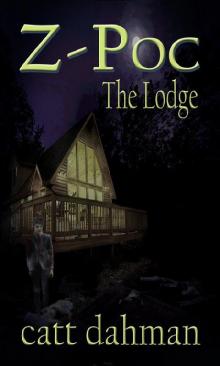 Z Poc: The Lodge
Z Poc: The Lodge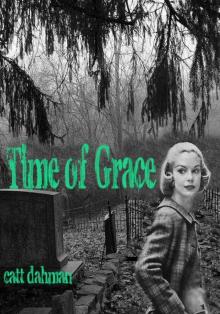 Time of Grace
Time of Grace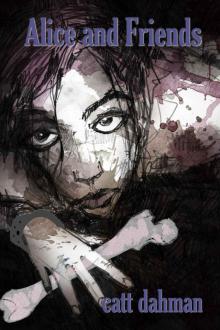 Alice and Friends
Alice and Friends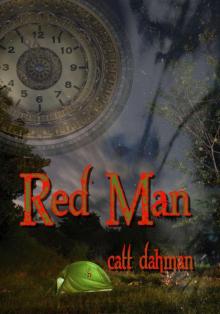 Red Man
Red Man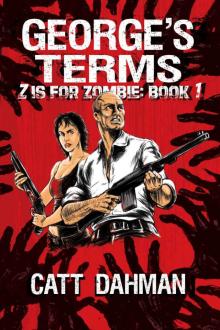 George's Terms: A Zombie Novel (Z Is For Zombie Book 1)
George's Terms: A Zombie Novel (Z Is For Zombie Book 1)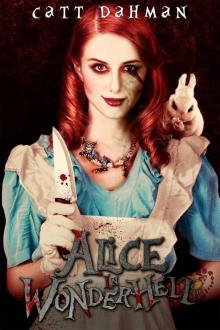 Alice In Wonderhell
Alice In Wonderhell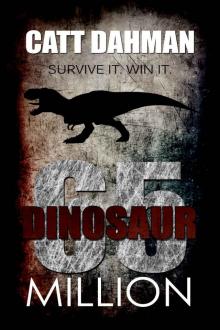 Dinosaur: 65 million
Dinosaur: 65 million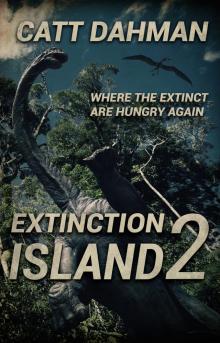 Extinction Island 2
Extinction Island 2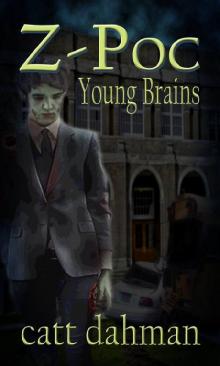 Z Poc: Young Brains
Z Poc: Young Brains Of Guilt and Innocence: Institute at the Criminally Insane (Virgil McLendon Thrillers Book 3)
Of Guilt and Innocence: Institute at the Criminally Insane (Virgil McLendon Thrillers Book 3)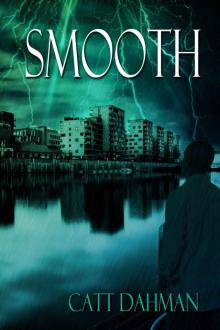 Smooth
Smooth Extinction Island
Extinction Island Of Lost and Found (the Kingsborough House): Kingsborough House (Virgil McLendon Thrillers Book 4)
Of Lost and Found (the Kingsborough House): Kingsborough House (Virgil McLendon Thrillers Book 4)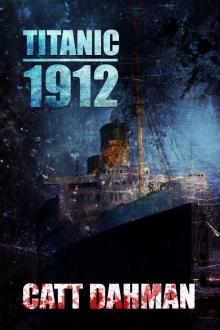 Titanic 1912: A Lovecraft Mythos Novel
Titanic 1912: A Lovecraft Mythos Novel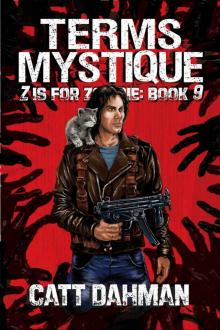 Terms Mystique: Z Is For Zombie 9
Terms Mystique: Z Is For Zombie 9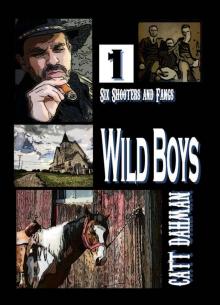 Wild Boys: Six Shooters and Fangs
Wild Boys: Six Shooters and Fangs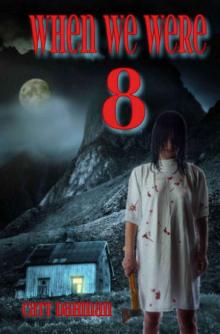 When We Were 8
When We Were 8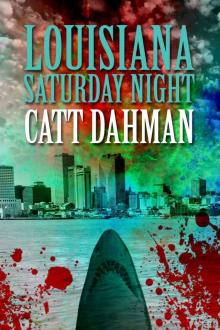 Louisiana Saturday Night
Louisiana Saturday Night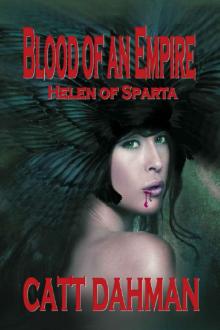 Blood of an Empire: Helen of Sparta
Blood of an Empire: Helen of Sparta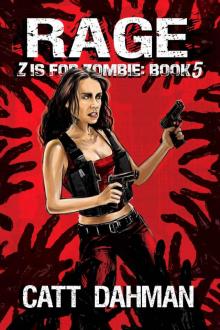 Rage: Z Is For Zombie Book 5
Rage: Z Is For Zombie Book 5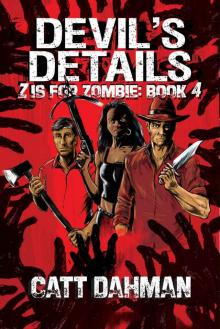 Devil's Details: Z Is For Zombie Book 4
Devil's Details: Z Is For Zombie Book 4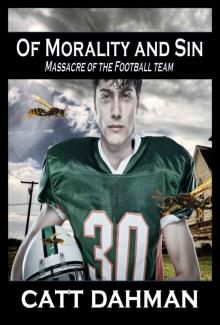 Of Morality and Sin: Massacre of the Football Team (Virgil McLendon Thrillers Book 7)
Of Morality and Sin: Massacre of the Football Team (Virgil McLendon Thrillers Book 7)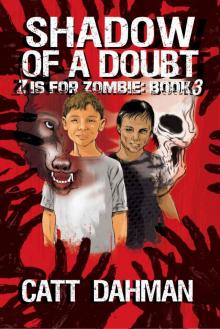 Shadow Of Doubt: Z Is For Zombie Book 3
Shadow Of Doubt: Z Is For Zombie Book 3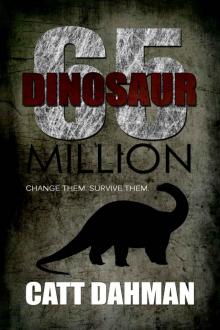 Dinosaur: 65 Million: Book 2 Change Them, Survive Them
Dinosaur: 65 Million: Book 2 Change Them, Survive Them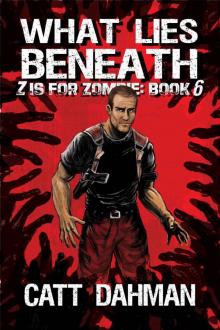 What Lies Beneath: Z is for Zombie Book 6
What Lies Beneath: Z is for Zombie Book 6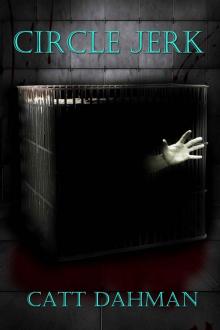 Circle Jerk
Circle Jerk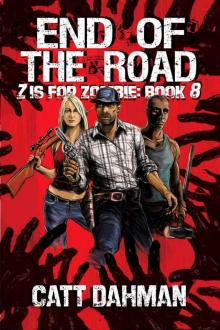 The End of the Road: Z is for Zombie Book 8 (Z is for Zombie: Book)
The End of the Road: Z is for Zombie Book 8 (Z is for Zombie: Book)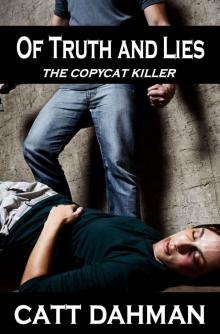 Of Truth and Lies: Hollingsworth Copycat Killer (Virgil McLendon Thrillers Book 5)
Of Truth and Lies: Hollingsworth Copycat Killer (Virgil McLendon Thrillers Book 5)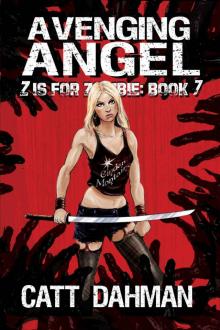 Avenging Angel: Z is for Zombie Book 7
Avenging Angel: Z is for Zombie Book 7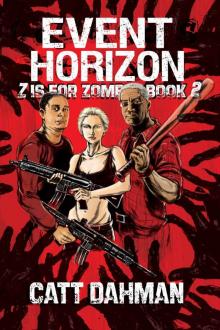 Event Horizon: Z Is For Zombie Book 2
Event Horizon: Z Is For Zombie Book 2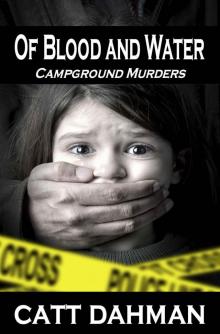 Of Blood and Water: Campground Murders (Virgil McLendon Thrillers Book 1)
Of Blood and Water: Campground Murders (Virgil McLendon Thrillers Book 1)